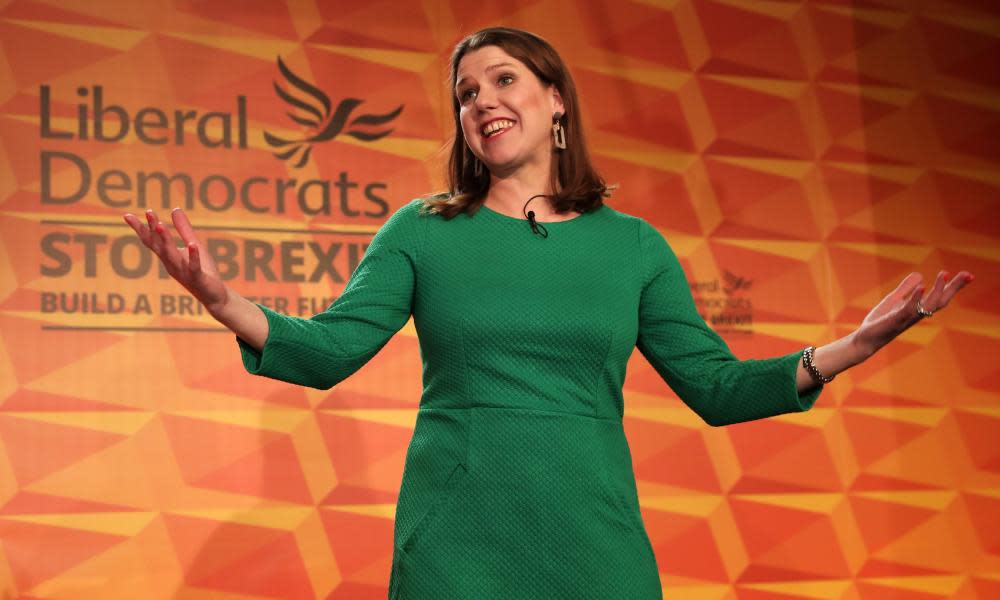The Guardian view on the Lib Dem manifesto: missing the moderate opportunity

Britain’s electoral system is cruel to small parties. What prominence they achieve in mid-term local government ballots and byelections is lost in a general election, when cultural habit and constituency arithmetic see the traditional Labour-Conservative duopoly reassert itself in England. In a general election the identity of the next prime minister is also uppermost in voters’ minds. That person is unlikely to be Jo Swinson. The Liberal Democrat leader insists she is capable of the job and her credentials are no worse than those of any other candidate. But Ms Swinson will not command a majority in the next parliament and the public knows it.
Yet the Lib Dems’ most prominent policy – cancelling Brexit by revoking article 50 – is predicated on that outcome. Their credibility suffers as a result. The party’s manifesto, published on Wednesday, recognises that “in other circumstances” EU membership would be defended in a second referendum. How those circumstances might be engineered is not clear. Nor, in fairness, are potential deals and coalitions a matter for the manifesto, which has to presume Lib Dem government even if no one else does.
But revocation is an extreme step that sits awkwardly with the party’s reputation for moderation. This election presents a unique opportunity for the Lib Dems to occupy electoral space vacated by radical shifts to the left and right by Labour and Tories. There is a lot of room between Corbynite socialism and the Tories’ hard Brexit. To fill the vacancy, Lib Dems need to eschew unrealistic promises and speak plainly of complexity, compromise and trade-off. The implicit promise should be a leavening influence, bringing rational scepticism where others pump out ideology. The improbability of outright victory can liberate Ms Swinson to speak uncomfortable truths.
One example of welcome candour is the Lib Dem pledge, carried over from the 2017 manifesto, to finance the NHS with a one penny income tax rise. All parties are in a bidding war to fund public services and national infrastructure. The arguments over deficits that dominated politics for a decade have made way for a new post-austerity consensus, with even the Conservatives promising looser purse strings. Much of this fiscal bounty will be achieved by higher borrowing (regardless of who is in power) but a serious recalibration of what the state provides also requires tax rises. There might be loopholes to close and fat cats to squeeze, but the reality of a broader, more sustainable tax base is that many ordinary middle-income voters will also be expected to contribute. Jeremy Corbyn and Boris Johnson pretend otherwise. To the Lib Dems’ credit, they do not.
Most of the manifesto is sensible and unremarkable, covering terrain familiar to those who pay regular attention to Lib Dems. The party is in favour of well-resourced public transport, a greener economy, civil rights and – their niche speciality – wide-ranging constitutional reform, including proportional representation and enfranchising 16-year-olds. The case for structural reform is bolstered by the spectacle of Brexit ripping up informal conventions of British democracy in recent months, but there are always more urgent matters demanding limited public attention in a general election campaign.
Under such constraints it is easy to see how the Lib Dems came to think their Brexit annulment policy was clever. It declares a simple position and speaks directly to millions who think leaving the EU is a terrible idea – a position many had hoped, in vain, to hear from Labour. But even within that hard core of remainers, many are queasy about flatly dismissing the 2016 referendum result. There are excellent reasons to oppose Brexit, but the means by which it is done matter. The sensibilities of leave voters should not be dismissed out of hand, least of all by a party that names itself after the principles of liberalism and democracy. Ms Swinson is right to be defending Britain’s membership of the EU. But her task in the coming weeks is to do it in a way that is realistically aligned with public awareness of the available outcomes in this election.

 Yahoo News
Yahoo News 
